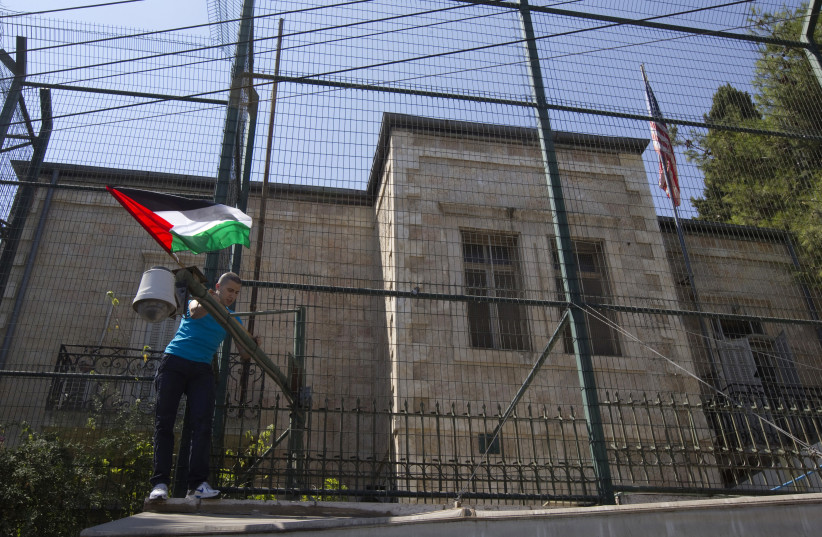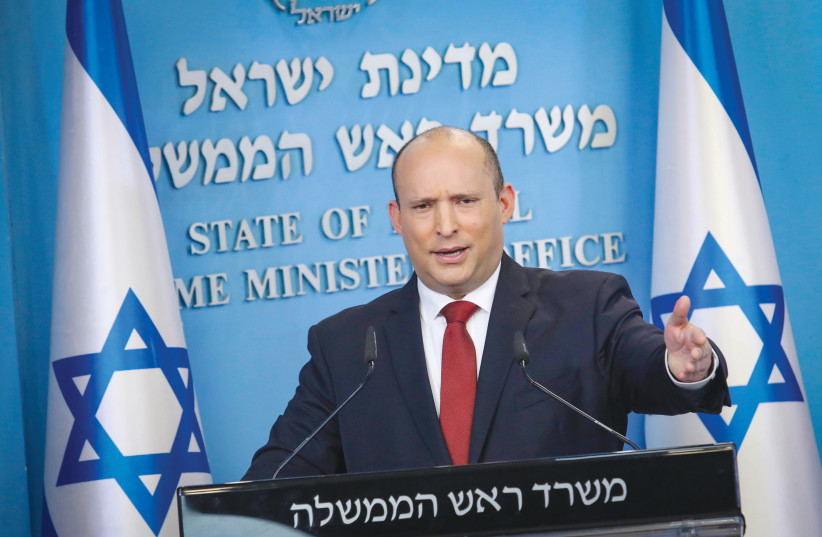"Jerusalem is the capital of one state, the State of Israel – period," the prime minister stressed.
By TOVAH LAZAROFF
Published: DECEMBER 28, 2021

A man places a Palestinian flag on a fence surrounding the U.S. consulate during a rally in support of Palestinian President Mahmoud Abbas' bid for statehood recognition in the United Nations, in Arab East Jerusalem September 21, 2011
(photo credit: REUTERS/Ronen Zvulun)
Israel is opposed to the re-opening of the United States' consulate for Palestinians in Jerusalem, Prime Minister Naftali Bennett told the Knesset on Monday night.
"The government under my leadership has repeatedly clarified its position that there is no place for a Palestinian consulate in Jerusalem," Bennett said.
"Jerusalem is the capital of one state, the State of Israel – period," he emphasized.
Israel is opposed to the re-opening of the United States' consulate for Palestinians in Jerusalem, Prime Minister Naftali Bennett told the Knesset on Monday night.
"The government under my leadership has repeatedly clarified its position that there is no place for a Palestinian consulate in Jerusalem," Bennett said.
"Jerusalem is the capital of one state, the State of Israel – period," he emphasized.
At issue is a Biden administration promise that it would reopen America's former Jerusalem Consulate-General that had serviced the Palestinian Authority and was considered to be a de-facto embassy for the Palestinians
.

PRIME MINISTER Naftali Bennett holds a press conference about the Omicron variant last week in Jerusalem. (credit: MARC ISRAEL SELLEM)
Former US President Donald Trump closed the consulate in 2019. Close to a year into his presidency, however, President Joe Biden has yet to make good on the reopening pledge, which would require Israel's consent.
Israel has opposed the move, which it believes gives the PA a foothold in Jerusalem and authenticates its claim that east Jerusalem is the future capital of a Palestinian state.
On Monday, MK Nir Barkat, Jerusalem's previous mayor, issued a scathing speech against Bennett in the Knesset on the issue of a Palestinian consulate in the capital.
"I want to announce here, from the Knesset podium, that Jerusalem is still in danger," Barkat said.
He charged that Israel, under Bennett's leadership, had promised the Biden administration it could re-open the US Consulate-General in Jerusalem, but then reneged on that pledge.
"In a recent conversation with a number of Congressional members, I was explicitly told that Tom Nides, the incoming ambassador of the United States, had told them, and I quote: Israel gave its consent to the opening of the Palestinian consulate, and then retracted it," Barkat said.
Israel asked the Biden administration to wait to re-open the consulate until after the budget was approved in November so as not to destabilize the government, Barkat said.
On that basis the Biden administration publicly announced, including in the media, that it would open the consulate, he said, adding that it "instructed Ambassador Nides to prepare for it" and that funding for it was included in a congressional budget.
Barkat then claimed that he personally worked with Congress and non-governmental groups to thwart the opening of the Consulate-General.
There were "36 senators who submitted a bill" against it and 200 congressional members who sent a special letter to Biden to ask that he shelve plans for the consulate, the former mayor said.
"How did you dare to make the Americans think they could divide Jerusalem?" he challenged Bennett, charging that it was a mistake that created "a serious diplomatic crisis with the US."
Now that the Biden administration believes the government could approve a Palestinian consulate in Jerusalem, it will continue to pressure Israel to make that concession, Barkat said.
The Biden administration "will continue to test the strength of our commitment here in Jerusalem and make tempting suggestions," he said.
Bennett dismissed the allegations with respect to Jerusalem as a campaign ploy, to strengthen Barkat's credentials for Likud leadership and replace former prime minister Benjamin Netanyahu.
Bennett said he wished both men luck and that normally, "I would have no special opinion on the internal struggles within the Likud."
Barkat, he said, had clearly been advised by a political consultant to go to Washington and generate attention on a large issue such as the consulate.
The prime minister said that the aspiring Likud leader had chosen to turn the Jerusalem consulate into a campaign that is "simply not good for Israel" to do so.
"We do not want to harm Israel," Bennett said, but that otherwise he was determined "to take the issue off the table," a move that was best done quietly.
Former US President Donald Trump closed the consulate in 2019. Close to a year into his presidency, however, President Joe Biden has yet to make good on the reopening pledge, which would require Israel's consent.
Israel has opposed the move, which it believes gives the PA a foothold in Jerusalem and authenticates its claim that east Jerusalem is the future capital of a Palestinian state.
On Monday, MK Nir Barkat, Jerusalem's previous mayor, issued a scathing speech against Bennett in the Knesset on the issue of a Palestinian consulate in the capital.
"I want to announce here, from the Knesset podium, that Jerusalem is still in danger," Barkat said.
He charged that Israel, under Bennett's leadership, had promised the Biden administration it could re-open the US Consulate-General in Jerusalem, but then reneged on that pledge.
"In a recent conversation with a number of Congressional members, I was explicitly told that Tom Nides, the incoming ambassador of the United States, had told them, and I quote: Israel gave its consent to the opening of the Palestinian consulate, and then retracted it," Barkat said.
Israel asked the Biden administration to wait to re-open the consulate until after the budget was approved in November so as not to destabilize the government, Barkat said.
On that basis the Biden administration publicly announced, including in the media, that it would open the consulate, he said, adding that it "instructed Ambassador Nides to prepare for it" and that funding for it was included in a congressional budget.
Barkat then claimed that he personally worked with Congress and non-governmental groups to thwart the opening of the Consulate-General.
There were "36 senators who submitted a bill" against it and 200 congressional members who sent a special letter to Biden to ask that he shelve plans for the consulate, the former mayor said.
"How did you dare to make the Americans think they could divide Jerusalem?" he challenged Bennett, charging that it was a mistake that created "a serious diplomatic crisis with the US."
Now that the Biden administration believes the government could approve a Palestinian consulate in Jerusalem, it will continue to pressure Israel to make that concession, Barkat said.
The Biden administration "will continue to test the strength of our commitment here in Jerusalem and make tempting suggestions," he said.
Bennett dismissed the allegations with respect to Jerusalem as a campaign ploy, to strengthen Barkat's credentials for Likud leadership and replace former prime minister Benjamin Netanyahu.
Bennett said he wished both men luck and that normally, "I would have no special opinion on the internal struggles within the Likud."
Barkat, he said, had clearly been advised by a political consultant to go to Washington and generate attention on a large issue such as the consulate.
The prime minister said that the aspiring Likud leader had chosen to turn the Jerusalem consulate into a campaign that is "simply not good for Israel" to do so.
"We do not want to harm Israel," Bennett said, but that otherwise he was determined "to take the issue off the table," a move that was best done quietly.
No comments:
Post a Comment